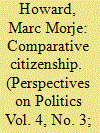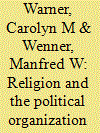|
|
|
Sort Order |
|
|
|
Items / Page
|
|
|
|
|
|
|
| Srl | Item |
| 1 |
ID:
075278


|
|
|
|
|
| Publication |
2006.
|
| Summary/Abstract |
In this article, I attempt to integrate the study of citizenship into debates in comparative politics, in two different ways. First, I justify the real-world importance of the topic, and thereby encourage other scholars to grapple with its manifestations and implications. Second, I present some suggestive evidence, based on the 15 "older" countries of the European Union (EU). The findings not only illustrate the extent of cross-national variation in citizenship policies at two different time periods, but they help to demonstrate the applicability of comparative analysis to categorizing and explaining both long-lasting cross-national differences and more recent change in some countries. In explaining the historical variation within the EU, I consider whether or not a country had a prior experience as a colonial power, as well as whether it became a democracy in the nineteenth century. In accounting for continuity or change over the last few decades, I argue that while various international and domestic pressures have led to liberalization in a number of countries, these usually occurred in the absence of public discussion and involvement. In contrast, when public opinion gets mobilized and engaged on issues related to citizenship reform-usually by a well-organized far right party, but also sometimes by a referendum or petition campaign-liberalization is usually blocked, or further restrictions are introduced. This finding raises important, paradoxical, and troubling questions about the connection between democratic processes and liberal outcomes.
|
|
|
|
|
|
|
|
|
|
|
|
|
|
|
|
| 2 |
ID:
075281


|
|
|
|
|
| Publication |
2006.
|
| Summary/Abstract |
Over the course of the last fifteen years states-along with companies, international organizations, non-governmental organizations, and others-have increasingly turned to markets rather than state-organized military hierarchies for security. This article puts forth hypotheses about how this marketization might affect three major literatures in international relations theory: the democratic peace, late state building, and theories of the frequency and nature of conflict. Relying on institutional logic, I argue that the marketization of security should redistribute power over the control of force. This redistribution should cause democracies to function differently-increasing the dilemmas between short-term security and long-term relations with other democracies. It should also reinforce the dilemmas pointed to by the literature on the resource curse and rentier states, thus deepening the expected difficulty of state building. Finally, as more states and non-state actors take advantage of market options for security, the oft-assumed collective monopoly of states over violence should suffer a blow. This should lead the chances for conflict to grow but also the purposes for which people and groups use violence to change. These propositions are not tested but serve as a call for further research.
|
|
|
|
|
|
|
|
|
|
|
|
|
|
|
|
| 3 |
ID:
075282


|
|
|
|
|
| Publication |
2006.
|
| Summary/Abstract |
These are not easy times for democracy. In the face of multinational corporations, an increasingly corrupt and deceitful political system, mega-media conglomerates, and militaristic televangelists, it is easy to understand how some radical democrats succumb to a politics of the bullhorn. The objective of such politics is to hone the correct line and strategize ways to project it clearly, loudly, and righteously into the public arena. Yet the success of politics thus framed has been marginal in recent decades, and its democratic credentials questionable-if by democratic we mean a politics that engages a manifold people in the difficult reciprocities of active critical judgment, organizing, action toward common goods, more egalitarian distributions, and deepening acknowledgments of plural modes of being. Most Americans are Teflon to it.
|
|
|
|
|
|
|
|
|
|
|
|
|
|
|
|
| 4 |
ID:
075280


|
|
|
|
|
| Publication |
2006.
|
| Summary/Abstract |
Some analysts have raised serious concerns about the foreign and domestic policy implications of the large numbers of Muslims living in Western Europe. The fear is that Muslims as a bloc will co-opt the domestic and foreign policy of various European states, subsuming it to those of Muslims from a variety of Islamic states in the Middle East and Asia, and transform the secular nature of most European states. The historic and ingrained fear of Islam present in the populations of Europe (and, for that matter, the United States) has produced an inability to see the political nature of Islamic groups, especially outside the Islamic world. For example, both Europeans and Americans were quick to question the political motives and actions of Muslims in Europe and the U.S. when there was no organized and orchestrated condemnation of the attacks of September 11, 2001. What such critics fail to take into account is precisely one of the themes analyzed in the paper: the myriad divisions found among the Muslims of Europe. Western fears and criticisms are partly based on serious ignorance of the characteristics of Islam and of the people in Europe who adhere to it. Because Islam is a highly decentralized religion, it is structurally biased against facilitating large-scale collective action by its adherents. The one version which is hierarchically organized, the Shi'a, is barely present in Europe. In addition, Muslim immigrants are divided by their ethnic differences. Islam, being decentralized, allows for a myriad of practices in the different countries from which the immigrants came. Divided by ethnicity and by their own religious beliefs, Muslims in Europe will not constitute a group which will be able to impose its goals on European foreign and domestic policy. Muslims will, instead, be a diverse population with which European states find it difficult to negotiate, because of Islam's decentralized structure. a Footnotes a Carolyn M. Warner is Associate Professor of Political Science and Global Studies, Arizona State University (carolyn.warner@asu.edu). Manfred W. Wenner is Visiting Scholar, Department of Political Science, Arizona State University (mwwenner@northlink.com). The authors wish to thank Guity Nashat Becker, Jocelyne Cesari, Colin Elman, Miriam Fendius Elman, Roger Finke, Paul Froese, Anthony Gill, Phillip Hardy, Michael Hechter, Jennifer Hochschild, Kevin Jacques, Ramazan Kilinc, Timur Kuran, Peter McDonough, Michael Mitchell, Christopher Soper, Hendrik Spruyt, Robert Youngblood, three anonymous reviewers, the participants at the University of Washington Center for European Studies/European Union Center "September 11, Immigration and Nationalism in Europe" seminar, and the participants at the University of Wisconsin Madison "East and West: the Experience of Islam in an Expanding Europe" conference for their critical comments and suggestions. Errors and shortcomings remain our responsibility. The authors thank Beatrice Buchegger, Anita Clason, Katie Jordan, Megan McGinnity, and Seth Turken for research assistance, and the Arizona State University Center for the Study of Religion and Conflict for financial support.
|
|
|
|
|
|
|
|
|
|
|
|
|
|
|
|
| 5 |
ID:
075279


|
|
|
|
|
| Publication |
2006.
|
| Summary/Abstract |
Pragmatism, decentralization, and pluralism are typically associated with modern democracies. Yet these are also the attributes that make Islam a widely accessible political-cultural resource. Indeed, such attributes allow for multiple activisms while sparing activists the macro-coordination challenges that often hamper growing movements, and the inertia that can seize vertical organizations. But while Islamists across the spectrum have increasingly deployed this resource, secularists of various stripes have mostly eschewed it. The aggregate effect has been to amplify the voices and to raise the profiles of Islamist groups at the expense of self-described moderns and their secular ideologies. I call this Islamism's reverberation effect.
Deliberate integration of Islamic tradition with democratic thought and action holds substantial promise. Pro-democratic Muslims, backed by Islam's renovated classical principles and practices, can better counter supremacist claims as they arise in the plural contestations that Islam itself helps generate. They can also realistically seek a firm consensus on the inviolable status of Islamic tolerance, which in turn can serve as a functional equivalent to the central authority that Islam lacks. Most importantly, by reconsidering the modernist ideational boundary that separates religion and politics, pro-democratic Muslims can begin to reclaim the transformative power of tradition.
|
|
|
|
|
|
|
|
|
|
|
|
|
|
|
|
|
|
|
|
|